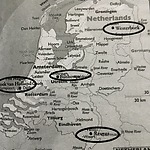On the terrible ninth and tenth of November, 1938, throughout Germany and Austria and the borders of Czechoslovak-Slovakia -which were now under German dominions-, the Nazis unleashed a series of pogroms against the Jewish population in Germany and the recently incorporated territories. This event became called Kristallnacht (The Night of Broken Glass) because of the shattered glass that littered the streets after the vandalism and looting of Jewish homes, Businesses, and Synagogues. An estimate of 1000 Synagogues was set on fire and be destroyed during that time as well as 7,775 Jewish Businesses. There is no report that can tell us how many Jewish homes or apartments were vandalized or looted. Many Jews died during Kristallnacht including 56 women and children.
The order went forth that every male Jew between the ages of eighteen and sixty was to be rounded up and sent to a concentration camp. and with a few exceptions, this came to pass, in the circumstances of the most horrible brutality. Some 30,000 men in Germany alone were rounded up and selected for transport to the concentration camps of Buchenwald, Sachsenhausen, Dachau, and other concentration camps. Certain age groups and certain people who had served in First World War were released.
The moment when the Kristallnacht happened in the afternoon of November 8, 1938, was a horrible shock for the family and millions of other German Jewish men. Jakob and another locale Jewish man were taken to the nearby prison in Zulpich and harassed and intimidated. The next day Jakob and the other Jewish man were released from prison. Jakob had been a World War I veteran and had been rewarded with the Iron Cross and because of this, they released him from prison. He was told that he had to out of Germany within 8 days, an impossible task
What was not generally understood was that they were released on one condition, that they had to sign an official certificate to be out of the country within eight days. They might take with them something around $ 15.- in actual cash, according to the mood of the official who handled your case. Every one of the unfortunate souls signed. Their homes and businesses were confiscated and in most cases, the homes were looted.
We now know , that only a quarter per cent had the slightest hope of going anywhere. There was nowhere for them to go in the whole wide world. Who could take them in, with a capital of $ 15.- . What country had an economy that could support that influx of of hundred of thousands of penniless people, some desirable and an asset to any country, others of very ordinary value in any community and of less than no value if torn from their natural moorings? And so form the center of Europe began to pour hundreds of thousand of the most desperate letters that have ever been written in the world. Everyone of them represented someone’s last hope, That was an impossible task, since it took a long time to get legal paper to leave Germany as well as a visa for a country that would take them in.
Ilse and Ruth remember that her father came by at the elementary school to bless his children and to say goodbye to them. Jakob then fled and he left for the Dutch border and he was successful in illegally crossing the border into The Netherlands. Jakob came as an illegal immigrant over the border and. After his registration with the authorities as a refugee on November 16, 1938, he was sent on January 5, 1939 to a refugee camp of Reuven, Limburg, The Netherlands. When he registered with the Dutch authorities he gave his address as Julianalaan 207, Bilthoven. This was the address where his mother in law Janette Behr Daniel lived. His wife Helene Scheuer Daniel and her 3 children were living there as well.
On August 29, 1939 Jakob together with his cousin Ernst Daniel were sent from refugee camp Reuven to a refugee camp in Hoek of Holland. After the German bombardment of Rotterdam on April 18, 1940, Jakob was sent to refeugee camp for Westerbork. The family 2 years later made a dicision that it was better to stay together as a family during these in certain times. Helene, son Ernst and daughters Ilse and Ruth left voluntarily for camp Westerbork. One and a half years later the German occupiers decided to make Camp Westerbork a systematic transit camp voor Jewish people that lived in The Netherlands.

